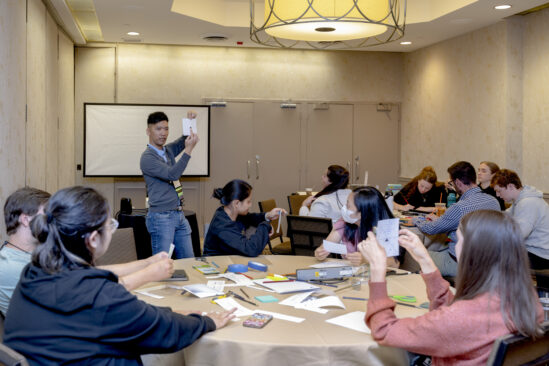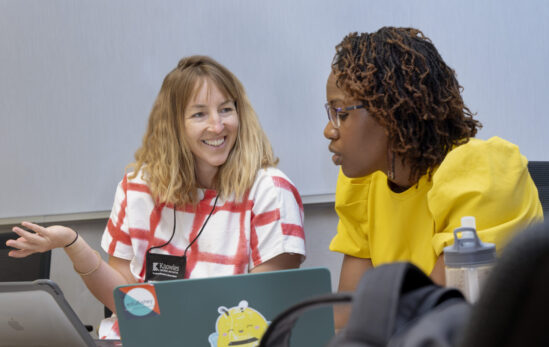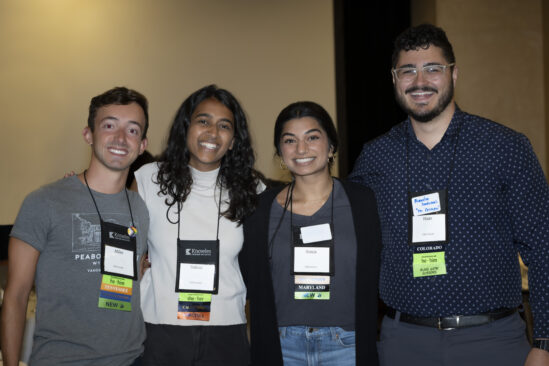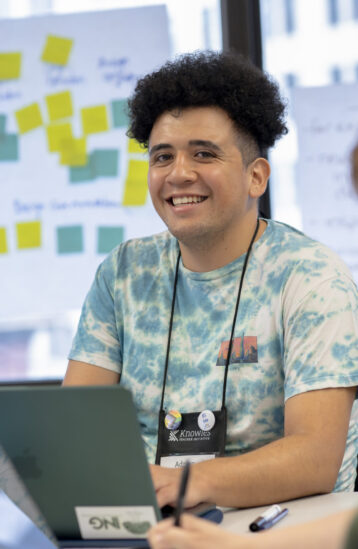Knowles President and CEO, Jeff Rozelle and Director of the Teaching Fellows Program, Jen Mossgrove join Board Member Joel Amidon on his podcast, Amidon Planet, to discuss the Teaching Fellowship Program and what it means to support early career teachers.
Listen NowTeaching Fellows Program
Knowles Teaching Fellowship Experience
Improving Classroom Instruction
In years one and two of the Fellowship, Fellows will examine their classroom as a system, identifying its components, interactions, and connections to broader systems like policies, curriculum, and cultural values. They will reflect on their own identities as teachers and learners, considering how their beliefs and actions shape student experiences.
Leading for Change
In years three and four, Fellows will build on their understanding of classrooms as systems and extend their leadership beyond individual practice. They will engage in collaborative inquiry with colleagues, analyze the influence of broader systems and policies, and identify leverage points for creating more equitable learning environments.
Knowles Teaching Fellowship Benefits

Financial Support
Each year, Knowles Fellows receive an annual budget, with up to half available for stipends, helping to reduce financial burdens and support professional growth. Grants are also awarded to cover classroom materials, professional development, and leadership activities that extend beyond their own classrooms. This funding empowers Fellows to focus on teaching, leadership, and meaningful impact.

Mentoring & Coaching
We value the expertise and knowledge of experienced teachers, which is why coaching and mentoring new teachers is a key component of our Teaching Fellowship. Our program staff and Teacher Leader Mentors, with over 100 years of collective teaching experience, regularly check in with Fellows, help them plan and reflect on instruction, discuss professional dilemmas, and provide support through personal challenges.

Community Membership
Knowles Fellows tap into a support network of over 600 teachers dedicated to improving education. Whether through in-person meetings, online discussions, or monthly Zoom meetings, being part of the Knowles community ensures Fellows have access to resources and support from a diverse, innovative group of committed professional educators.

Lifelong Connections
After completing the Fellowship, Teaching Fellows become Senior Fellows. The Senior Fellows Program allows them to stay involved in the Knowles community and receive ongoing support for leadership efforts throughout their careers. Being part of our community offers a lifelong connection to valuable resources and support.
Community at the Core of the Fellowship
We believe that teaching, learning, and leadership thrive in community—but too often, teaching can feel isolating. The Knowles Fellowship connects teachers through three interconnected communities: their cohort, their regional network, and the national community of Fellows. Each offers unique support and perspective, helping Fellows grow as educators and leaders with the capacity to improve education alongside others.
Cohort Community
Each year, more than 35 new math and science teachers join the Fellowship as a cohort. As early-career educators, they share similar challenges and milestones—creating a powerful space for mutual support, reflection, and celebration. The cohort becomes a trusted learning community that anchors Fellows in the first phase of their journey.
Regional Community
Recognizing the local context of teaching, Fellows also connect within five regional communities. These groups provide both informal and structured opportunities to collaborate, share region-specific challenges, and build lasting relationships with nearby Fellows.
National Community
All Fellows are part of a broader national network of over 500 committed educators. This diverse community spans generations of teachers, offering inspiration, mentorship, and opportunities to collaborate across geographic and content-area boundaries.
Learn More
What it means to truly support early career mathematics and science teachers.
Fellow Story: NASA HUNCH Program
Teaching Fellow and engineering teacher Dawson Lang brought 23 students from Chatfield Senior High School to Houston to present their innovative engineering projects to NASA engineers through the NASA HUNCH program—an initiative that connects high school students with real-world aerospace challenges.
Read MoreGive opportunities and support to teachers… they will want to stay.
Hear from Joyce Lin as she shares why teaching matters and how teachers can lead beyond the classroom in this episode of Our Voices on Teaching, Charles Butt Foundation.
View Video